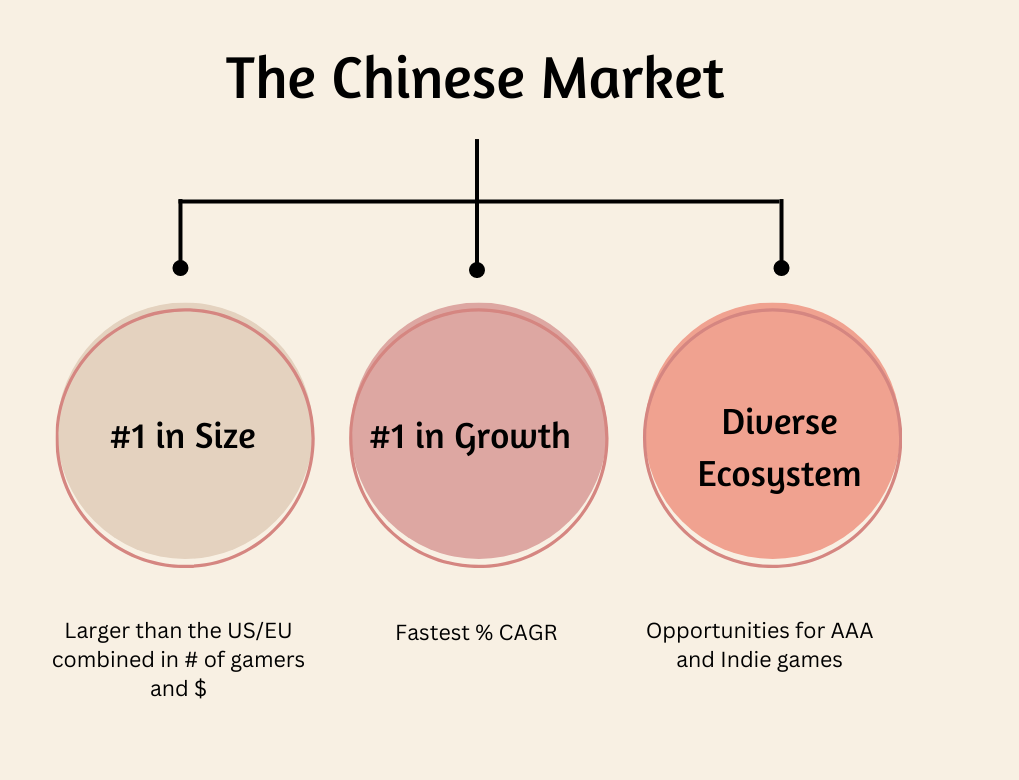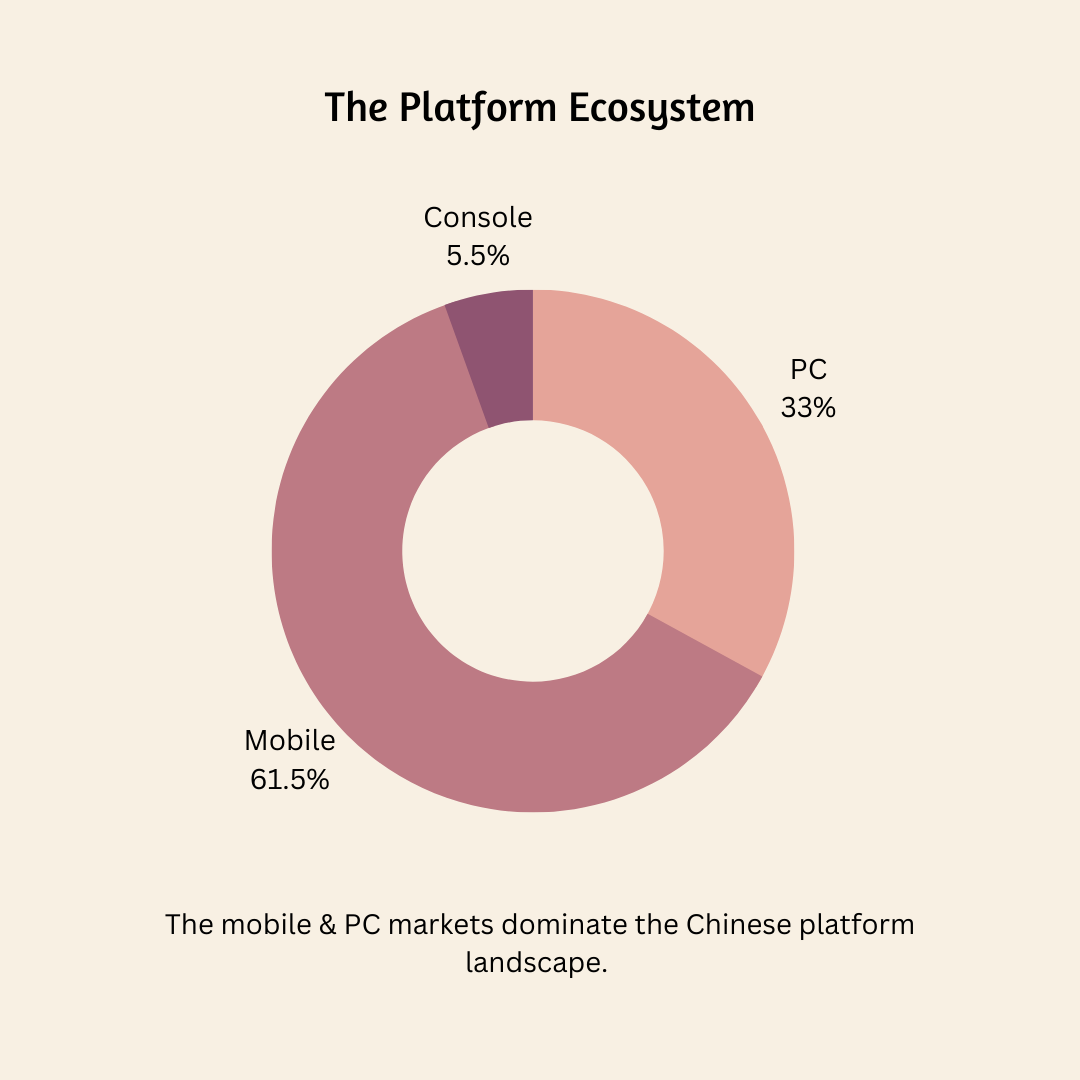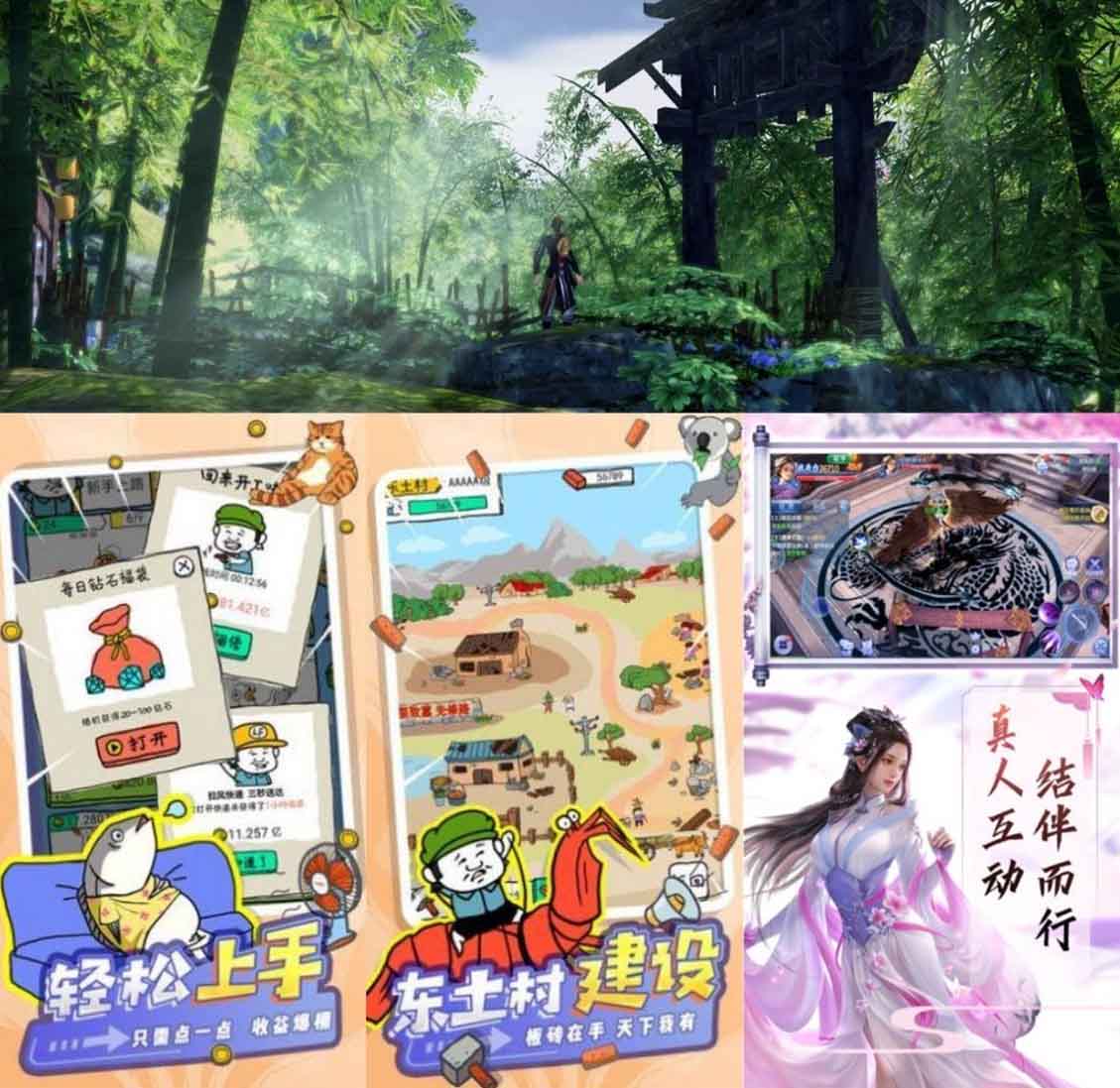Why should you publish your games in China?
With a population of over 1.4 billion, China offers a vast pool of potential gamers. Furthermore, due to the economic explosion in the last decades, China’s middle class and increasing disposable income are becoming increasingly lucrative targets. By tapping into this market, you can dramatically increase your player base and, subsequently, profits. Furthermore, the Chinese government’s recent efforts to regulate the gaming industry have led to a more structured and stable environment, making it an interesting time for foreign developers to publish a game in China.
The Chinese video game market
In the last decade, the Chinese gaming market has surpassed the US and EU in sheer numbers and economic value. In fact, it is estimated that there are 720 million gamers in China, compared to almost 600 million gamers in the US/EU combined. While the spending power of Chinese gamers is still lower than their Western counterparts, it is a more homogeneous block that is quickly catching up in spending power. The Chinese market generated $45 billion in value in 2022. On the other hand, the USA’s gaming market generated $30.4 billion in 2021. With such a vast market at your disposal, it is clear that the potential for revenue generation in China is immense. You can gain a significant share of this growing pie by publishing your game in this market.The growth of the Chinese gaming market
Despite recent regulatory shifts, the growth of China’s gaming market has been nothing short of phenomenal. Over the past decade, the industry has witnessed a compound annual growth rate (CAGR) of around 14%, making it one of the fastest-growing markets globally. This growth is fueled by several factors, such as rapid urbanization, increasing smartphone penetration, and a cultural shift that has seen gaming become an increasingly mainstream form of entertainment.A unique platform ecosystem
Due to its regulatory history, China has a unique platform landscape with opportunities across genres and sizes. Let’s delve into the specifics:- PC market – The bedrock of China’s gaming industry, the PC market, has remained strong despite the rise of mobile gaming. In fact, PC gaming still accounted for $13.9 billion in revenue in 2020 and is projected to continue growing. Although there is some overlap between PC and mobile gamers, this category accounts for 325 million gamers.
- Mobile market – Mobile gaming has exploded in China, fueled by the widespread adoption of smartphones and the popularity of free-to-play games. In 2021, mobile gaming accounted for over 50% of the total gaming revenue in China.
- Console market – With a relatively tiny size ($2.16 billion in value), the console market is a good fit to find a niche. It has been steadily growing since the Chinese government lifted the ban on console sales in 2015. With major players like Sony, Microsoft, and Nintendo establishing a presence in the market, it is expected to reach almost $ 2 billion in revenue by 2026.
 Assuming we’ve convinced you of the region’s potential, it is time to discuss the publishing process.
Assuming we’ve convinced you of the region’s potential, it is time to discuss the publishing process.What are the requirements to publish a game in China?
💡
1. A Game Software Copyright Certificate
Before you can even deal with the core regulations, you must ensure your partners are authorized to use your copyright in China. To do this, you must apply to the National Copyright Administration of China (NCAC) and obtain the Game Software Copyright Certificate (GSCC).
This step is relatively simple but essential. You can do it directly at the Beijing headquarters or through their website. The main document you’ll have to submit is a work sample, a 30 to 60 page document containing all your materials. Of course, it needs to be in Simplified Chinese. To avoid translation issues, relying on a trusted agency is a must.
2. An ICP certificate
As the name indicates, the Internet Content Provider (ICP) certificate authorizes a company to host a website and participate in digital commerce. Without an ICP, you can’t sell your game in China, nor can you operate it.
On top of that, for the sake of protecting the privacy of local gamers, Chinese regulators require that the servers of games published in China (like yours) be located in China. And without an ICP, don’t expect to operate a server.
To be crystal clear, this is a step you can only complete indirectly. An ICP can only be obtained by a Chinese-owned company, entirely or partially (51%). In other words, your local partner is the one that can apply for the certificate, and they need to do so through the Chinese Ministry of Industry and Information Technology (MIIT).
To summarize, the ICP certificate gives a Chinese company the authorization to operate approved games. In other words, they become an accredited gaming publisher.
In most cases, we advise you to work with companies with an ICP and all the necessary operational structures to operate your game, such as Tencent or NetEase.
3. An Internet Publishing License
Before you can apply for an ISBN at the NPPA, you will need a partner with an Internet Publishing License (IPL). Similarly to the ICP, the IPL is granted exclusively to local companies and IPL holders, which we refer to as publishers in this article.
Typically, companies with an IPL are large companies appointed by the government to help game developers and publishers apply for an ISBN. They do not manage the game but rather are there to help ensure your game meets the necessary standards.
That being said, if you partner with big companies such as Tencent or Netease, they usually have the ICP and IPL. As such, they can apply at the NPPA in your name and publish and operate your game once it gets approved.
If you partner up with smaller operators, you must remember this distinction between the ICP and IPL. A company that has one does not necessarily have the other.
4. The anti-addiction system
In 2019, the NPPA implemented the world’s most stringent anti-addiction regulation aimed at curbing excessive gaming among minors. The rule barred gaming companies from permitting minors to play games from 10 PM to 8 AM and set a daily gaming limit of 1.5 hours. Even on public holidays, this limit was modestly increased to only 3 hours a day.
Then in August 2021, the NPPA tightened the rules even further. They decreased the maximum gaming time to just 1 hour and limited gaming hours to between 8 PM and 9 PM and only on Fridays, Saturdays, Sundays, and national holidays.
💭
The authorities also require all games to enforce a strict identity verification policy, likely to uphold the above-mentioned rules. Users must register with their real names and provide valid identification.
Gaming companies are prohibited from offering services, including simple demos or in-game browsing, to users who have not authenticated with their real identities.
These regulations require games to have time-tracking features and an automatic logout system. This ensures that minors automatically log out when they reach their maximum allowed gaming time.
Moreover, the regulation sorts users into four age groups, each requiring a different account type:
- Gamers aged 7 or under.
- Gamers aged 8 to 16.
- Gamers aged 16 to 18.
- Gamers aged 18 or above.
The final type can be viewed as a standard or “unrestricted” account.
These rules aren’t going away. In 2022 alone, the NPPA stated it would focus more on loopholes and places where these rules aren’t enforced. We can likely expect more similar regulations or the continuation of these in the future.
Therefore, before starting your application, ensure you’ve built a strong anti-addiction system, as outlined above.
Now that you have done most of the preparatory work, it is time to tackle the strictest review system in the world.
5. The NPPA review
The main regulatory body you and your publisher must contend with is the National Press and Publication Administration (NPPA), which has set up a strict review process that you must comply with.
💡
What is the NPPA?
The core issue with the review process that frustrates local and international developers alike is that some guidelines can be subjective and somewhat vague.
For instance, any materials perceived to endanger national unity are strictly forbidden. Of course, what you may interpret as threatening national unity might differ significantly from the NPPA reviewers’ perspective. Consequently, even if you believe your game meets their standards, you could face unexpected feedback.
We highly recommend leaning on the experienced publishers here. Their expertise can save you a lot of time and effort.
The main areas of your game you may need to edit or censor are the following:
- Political content: Avoid references to sensitive political issues or events in modern Chinese history. Anything perceived as undermining socialist values won’t be accepted.
- Discriminatory content: Ensure your game doesn’t contain content threatening ethnic unity or promoting discrimination.
- Religious content: Any content promoting cults, religions, and superstitions is unacceptable.
- Violence and gore: Excessive violence, blood, and gore may lead to the rejection of your game. Specifically, depictions of internal organs and bones are typically rejected.
- Sexual content: Nudity and explicit sexual content are prohibited in Chinese games.
- Gambling: Any form of gambling or gambling-related content is forbidden.

Which games are more likely to be accepted?
Generally, the NPPA views games promoting Chinese cultural values more favorably, such as games showcasing patriotic acts in a socialist setting or fostering international cultural exchange. In fact, games highlighting Chinese history have a higher acceptance rate than other genres.
Consider the most recent batch of approved games illustrated above. The list comprises a diverse selection of RPGs, strategy games, roguelikes, and more. However, when examining the game settings, 10 out of the 30 games feature a historical backdrop. They draw heavily from depictions of the Three Kingdoms era and similar narratives.
Furthermore, 3 more games are influenced by the Wuxia genre. This represents 43% of the games.
Keep these trends in mind when conceptualizing your next game.
5.1. The Game Evaluation Rating and Guidelines System
The NPPA uses a five-factor review process known as the Game Evaluation Rating and Guidelines System (GERGS). Each category is scored from 0 to 5, and scoring 0 in any category results in review failure, even if the other four categories score a perfect 5.
The GERGS categories include:
- Value orientation.
- Original design.
- Production quality.
- Cultural content.
- Development stage.
We’ve already discussed categories 1 and 4 in the previous section. The remaining categories (2, 3, and 5) evaluate your game’s unique value and aren’t directly linked to censorship.
The regulators tend to reject “copycat” games that don’t contribute valuable new content. A game that’s original in both its storyline and gameplay is seen more favorably than games that simply replicate existing content under a new appearance. Naturally, fully developed games are preferred over those still in the beta/alpha phase.
To review your game comprehensively, the NPPA expects you to submit a variety of documents, including:
- Screenshots: Provide a few unedited screenshots that clearly demonstrate your game. These should display basic elements like the user interface, menus, and gameplay scenes.
- Plot and Dialogue: A document outlining all game plots, dialogues, and in-game text is necessary. This includes character dialogues, quest texts, names (of characters, cities, items, etc.), and menu text.
- Anti-addiction Documentation: Submit a comprehensive document detailing the anti-addiction system implemented in your game and its functionality (see section 4).
- Game Copies: Provide copies of the game and all the necessary software and hardware to access and play it. Whether that’s goggles or game accounts.
- Additional Content: Digital copies of all manuals, instructional booklets, box art, and related content must be included. A video of the game demo is also required.
Remember, the information provided here is not exhaustive. We strongly advise you to visit their website and thoroughly discuss the application process with your publisher.
Please note that each game has an application cap (typically 2-3 times). If your application fails repeatedly, your game may face permanent disqualification.
💡
What is an ISBN?
Despite this rigorous process, there’s still cause for optimism. For instance, in March 2023 alone, 27 new international titles were issued vital licenses. While this may seem like a small number, consider that in the entirety of 2022, only 44 foreign titles were approved after a ban lasting 1.5 years.
6. The National Radio and Television Administration (NRTA)
You may not need to deal with the NRTA, depending on your goals. This body doesn’t regulate in-game content, so if your primary goal is just to sell your game in China, the NRTA’s approval isn’t necessary.
However, if you plan to market your game through promotional videos—which, frankly, is pretty standard in the industry today—you’ll need the NRTA’s approval. The NRTA manages the distribution and promotion of digital content in China, including live streams, streaming services, podcasts, and videos.
On a positive note, the requirements of the NRTA largely align with those of the NPPA. If your game has been modified to meet the NPPA’s rules and has received an ISBN, you should be able to navigate the NRTA’s rules easily. Here are the most relevant regulations for your situation:
- Online platforms can’t host films, dramas, live streams, videos, or any audiovisual content based on a game that has not been approved (including esports).
- Online platforms can’t use their content to divert traffic to unapproved games
- Livestreaming platforms, especially gaming-focused ones, must manage and monitor their platform to ensure it doesn’t host harmful content.
- Before any content (as per rule #1) can be launched or broadcast, it must be submitted to the relevant authorities and received approval.
For the complete list, head to the NRTA’s website (it’s in Chinese).
Now that you understand the many (MANY) rules and regulations you need to navigate to publish a game in China let’s now delve into another crucial aspect: the publishers and their associated distribution platforms.

Frequently Asked Questions
Can you self-publish a game in China?
How long does it take to get an ISBN?
When does an ISBN expire?
Never. Once an ISBN has been assigned to a given game, it is permanent. Although there is a process for cancellation, it is excruciatingly complicated and rarely pursued.
Furthermore, an ISBN is tied to a single publisher. This means that the publisher who assists you in obtaining the approval for a specific game remains associated with that game and its ISBN indefinitely—you're "locked in."
However, it's worth noting that while the ISBN-linked publisher remains constant, game distributors and publishers can be switched. If you find this distinction confusing, read here and here.




